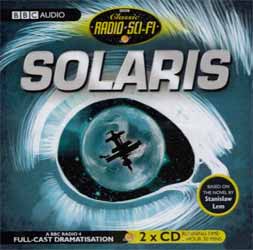|
Click here to return to the main site. Audio Drama Review
When psychologist Kris Kelvin, arrives at the scientific research station hovering high above the surface of Solaris, he finds the place deserted except for two scientists, who have been driven mad by some unknown horror. The researchers had been trying to investigate the ocean planet, and probe the secrets of its alien lifeforms. But their clumsy, aggressive approach has provoked a terrifying response from the ocean, which is now confronting them with their most painful repressed thoughts and memories in human form. Kris is faced with the manifestation of his long-dead wife, Rheya, and his guilt over her suicide, but whatever is tormenting the other scientists appears to be worse... Solaris is based on Stanisław Lem's 1961 novel and revolves around a group of scientists who have been conducting ongoing research for years on a strange ocean lifeform that inhabits the planet Solaris. When the researchers become more aggressive in trying to force contact, the ocean's response is to experiment with the researchers' minds by confronting them with their most painful and repressed thoughts and memories through the materialisation of complex human constructs. Incredibly slow moving, Solaris, relies on a steady build to allow the audience to feel for Kelvin's character and the dilemma he has to face as his dead wife seems to have returned from the grave. While he knows it's not her, it's not long before Kelvin starts to see her appearance as a chance to finally lay the ghosts of the past to rest. The story, on the surface, seems about as shallow as you can get: A psychologist arrives at a research station where everyone has gone mad. His dead wife starts to appear to him and he discovers that it's the planet playing with his mind... but there is so much more going on with this tale. It's also pretty moving too. I was surprised to discover, through the sleeve notes, that this adaptation was first broadcast in 2007. To be honest it sounded a lot older and I was expecting to learn that it was produced in the '70s. In fact, the only thing that gives away that it is a modern recording is the fact that the voice of the computer (who I suspect is the same person who lends her voice to the end credits) has a slight accent. There's definitely a hint of a Lancastrian upbringing there. I'm afraid, on this score, it sounded very out of place. Computers with accents are hardly likely to you instill confidence that your well being is fine in their hands - especially when none of the scientists have accents. I mean, can you imagine if you got on a BA plane and the captain's voice came over the speakers with a thick Liverpudlian accent? It was therefore no surprise to learn that this drama was produced in Manchester. Now, is this the sort of thing we are likely to see become more common place if the BBC's planned move to Manchester goes ahead; accents becoming the norm? I for one hope not. It's already started to become annoying how many presenters on TV and local radio stations have annoying accents, the BBC is the last place I want to hear regional dialects thrust down my earlobes. I was brought up in South Yorkshire, but I wouldn't want to hear my old accent all over the place. Anyway, ignore the ramblings of a mad man - looks like some ghosts from my past came back to haunt me too. Solaris is a pretty enjoyable play which does a great job of transferring the novel into a credible play. 8 Nick Smithson Buy this item online
|
|---|


